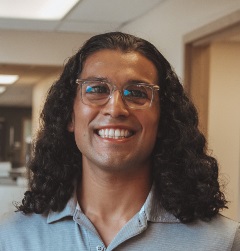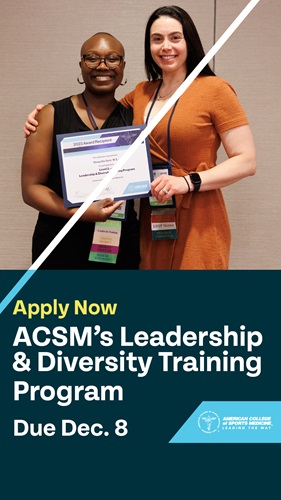Joe Sherlock, ACSM Copywriter |
Nov.
22, 2023
 Rafael Alamilla’s affiliation with ACSM’s Leadership & Diversity Training Program (LDTP) began with an interesting coincidence.
Rafael Alamilla’s affiliation with ACSM’s Leadership & Diversity Training Program (LDTP) began with an interesting coincidence.
An IU President’s Doctoral Fellow in Indiana University’s Department of Health Sciences, Alamilla had heard about ACSM’s LDTP somewhat by chance — whether it was from ACSM social media, an email, or some other communication, he can’t exactly recall. But it appeared in his orbit, it seemed like a fruitful opportunity, and he emailed his advisor to get her opinion on the matter.
Said advisor happened (and still happens) to be ACSM Past President NiCole Keith, Ph.D., FACSM. Keith responded by sending Alamilla a manuscript she helped write that outlined the establishment and impact of program she helped found. This was, of course, an endorsement.
Which carried a lot of weight — Alamilla is quick to praise Keith as an advisor: “She has always been in my corner since I’ve been in my program. She is my mentor, obviously. But nowadays she is kind of my research mom.”
Naturally, Alamilla applied.
When you visit the LDTP’s page on the ACSM website, you read that “ACSM’s Leadership & Diversity Training Program exists to mentor and retain minority members by offering three different levels that require ACSM membership, involvement in the ACSM Annual Meeting and committees, and pursuit of ACSM professional presentations & publications with the ultimate goal of obtaining ACSM fellowship.”
Besides being paired with an experienced mentor, those accepted into the program receive a free year of ACSM membership and have their ACSM meeting travel and registration expenses covered. Accepted applicants matriculate into LDTP at Level 1, 2, or 3 depending on their academic background. Roughly speaking, those enrolled in a master’s program will join Level 1, those enrolled in a Ph.D. program join Level 2, and those who hold a terminal degree will enter at Level 3. Mentees can take part in the program for up to five years.
Critically, participants don’t merely communicate with their assigned mentor — when the ACSM Annual Meeting rolls around, the mentees often meet up with a number of the participating mentors.
As Alamilla puts it: “They very much encourage you to go talk with other mentors. It’s like: ‘Yes, your primary mentor is the one who you’ll be spending a lot of time with during the conference, but also don’t be afraid to pick other peoples’ minds and network. I've had the wonderful fortune of talking to a lot of the mentors and learn from them.”
But for Alamilla, who is in his second year in the program, the greatest benefit has been the community of mentees that LDTP brings together.
“The program has helped facilitate me meeting other people who look like me,” he says. “Even if they do not do similar work, their perspectives are very insightful to me because everybody comes from different backgrounds. It is like, that’s the nice thing about national ACSM — you get to meet people and share stories with people you otherwise wouldn’t have met.”
If LDTP is a progressive program with a well-defined path and series of goals, the journey that brought Alamilla into its ranks was somewhat less linear. Alamilla hails from San Bernardino, CA and earned a Bachelor of Science in kinesiology from California State University-San Bernardino before moving on to a master’s degree in the same field at the University of Illinois Urbana-Champaign, which he describes as period in which he was focused on basic science. But after graduation, he moved to Memphis, Tennessee, where his future wife was completing her own master’s program.
In Memphis, he took a job with HealthFitness, which changed his trajectory entirely. Through HealthFitness, he was brought in to help run FedEx’s health and wellness programming.
“And that’s when I feel like I got hit a Mack truck in terms of being able to understand health disparities and inequities,” he says. “But also what it really means to work with people. Because up to that point, mind you, I had never gone outside of academia.”
Alamilla soon turned his attention to education again — but this time in pursuit of a Ph.D. that would allow him to address the disparities he’d seen.

“That’s what spurred me to want to do a Ph.D.,” he says. “I knew my skill set was not there to do the type of work that I wanted to do. So I knew I had to go back to school.”
It was while searching for the proper university that Alamilla became aware of Keith; she’d taken part in a panel Alamilla attended held by a research collaborative run by Dr. Mark Stoutenberg. The work Keith discussed intrigued Alamilla — it seemed like what he too wanted to do — and he sent her an email.
One thing led to another, including a series of long phone calls discussing their mutual research interests, and Alamilla eventually found himself studying with Keith at IU; his focus is on improving access and adherence to physical activity in underprivileged minority communities. Key to his efforts, he notes, are partnerships with community leaders and local fitness facilities — and getting constant feedback from the people his programming serves.
“With this type of work, there’s a certain degree of tailoring that happens, right?” he says. “You’re tailoring an intervention to the needs of a specific person or group of people. Whoever it is that you’re working with.”
As Alamilla’s academic career progresses apace, LDTP serves as a place where he can rub shoulders with others who have shared experiences, both in their personal lives and in their work.
“All the folks in LDTP are people of color or from a minority group,” Alamilla says. “And so a lot of us have those same experiences. A lot of us are first-generation college students. Many of us work with minority communities. A lot of us have had similar experiences going through academia. In turn, having that that shared sense of camaraderie is really powerful because it makes you feel like you’re not alone.”
If you or someone you know is interested in applying for LDTP, you can learn more here.